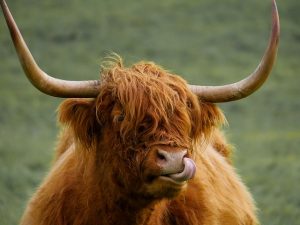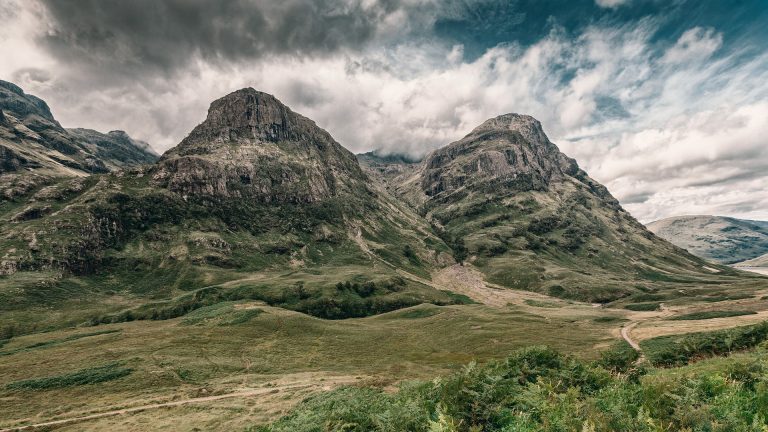Have you ever been struck by a painful longing for a place? Your official diagnosis is nostalgia. When the word first came into use it was coined as a medical diagnosis. According to the Merriam-Webster Dictionary, the nost- in nostalgia means “homecoming,” and the –algia in nostalgia means “pain.” Johannes Hofer (1669–1752) was a Swiss physician who named the condition, which he identified as a mania tied to homesickness in Swiss mercenary soldiers.
I think many Scottish Americans experience this meaning of nostalgia — we have an ache for Scotland. It’s quite understandable for those who have a direct connection through a recent immigrant because they have grown up with stories, songs, food and traditions from the homeland. But what about those whose ancestry is centuries old? Can you be homesick for a place you’ve never been?
My heart’s in the Highlands, my heart is not here,
My heart’s in the Highlands, a-chasing the deer;
Chasing the wild-deer, and following the roe,
My heart’s in the Highlands, wherever I go.-Robert Burns
Farsickness
Not surprisingly there is a Scottish Gaelic word to describe this feeling: cianalas, which doesn’t translate exactly in English but loosely means a deep-seated sense of belonging to the place where your roots lie. It is normally attributed to the Outer Hebrides. The feeling is common enough that other languages also have a word for it. In Welsh, it’s hiraeth, which has been described as a “longing to be where your spirit lives.” And the German word fernweh also seems appropriate; it means “farsickness” or longing for far-off places, especially those you’ve never visited before. Not surprisingly, when the online travel magazine Atlas Obscura asked its readership to describe places that gave them “fernweh” in 2018, Scotland and Ireland had an overwhelming number of responses!

Some Scottish Americans visiting Scotland for the first time describe breaking down and crying, or having a sense of calm and contentment, or an intense feeling of deja vu. Others claim that their blood remembers or that they have a genetic memory of the homeland. And it’s definitely possible. But while the study of epigenetics has revealed evidence of genetic memory in sea slugs, we’ve got a ways to go before we can say for sure that we have these feelings for Scotland because of our DNA.
One theory related to genetic memory that’s been given some credence is that trauma can be passed on through our DNA. If this is true, then doesn’t it make sense that we Scottish Americans and Scots Irish come by our cianalas for Scotland because of the circumstances under which many of our ancestors were forced to leave the homeland?
Genetic memory and trauma
While the years from 1717 to the Revolutionary War saw the largest immigration to America with an estimated quarter of a million Scots-Irish arriving from the Ulster Plantations, there were large and small waves of immigrants both before and after that period. And they didn’t come for a holiday! They came because they experienced some sort of trauma in their homeland. Whether it was politics, religion, economics or all three, they left Scotland primarily because they had to go. So for those of us with ancestors who left the homeland under traumatic circumstances, maybe our blood does remember!
Whether you currently live in Scotland, have a Scottish nana, have never been nor expect to go to Scotland, you have a right to claim your soul connection to the homeland! But don’t stop there. Learn about the place of your roots. Become a student of Scotland — read the history (there’s lots!), cook the food, share the traditions, listen to the music and explore the current culture. By immersing yourself in Scotland, you will be creating more genetic memory to pass on to future generations of Scottish Americans and Scots Irish.



5 Comments
Finding Keelan’s place in our Smoky mountain McFalls family was so much fun for me.
I was fortunate enough to visit Scotland a few years ago and my moment of coming home happened in the town of Thurso up at the very top of the highlands. It seemed that the town was filled with blue eyed black hair people! My people and I had come home.
Out of all the European countries, I have always dreamed of going to Ireland/Scotland for a long time (I’m 64) Up until last year I had no idea generations of my family came from there. My Grandmother was the first in her family to be born in the USA. She said her parents were from England, well via Scotland I was so welcomed into Clan Hunter. I will be there at the Clan gathering next year!!
It is wonderful to find and learn about ones’ roots. I’m glad you’ve discovered your ancestral connection to Scotland, and that you’ve connected with your Clan! Enjoy the 2021 gathering!
I’ve been dealing with cianalas for a couple years now, and this is the first article I’ve found that actually explains it and helps me not feel like I’m crazy. THANK YOU ❤️